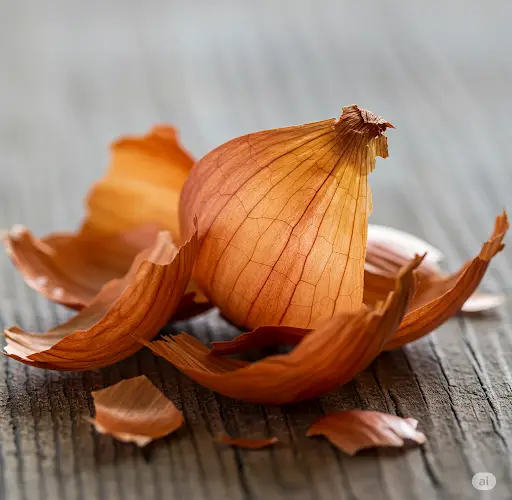Many gardeners are turning to natural, eco-friendly methods to nourish their plants and protect them from pests. Among the most surprising yet effective solutions is something that often ends up in the trash: onion skins. These papery peels are not only packed with essential nutrients but also help deter harmful insects and improve overall plant health.
Why Onion Skins Are Valuable for Plants
Onion skins are rich in several important elements that contribute to vigorous plant growth. They contain potassium, calcium, magnesium, iron, and powerful antioxidants such as quercetin. These nutrients strengthen plant cells, boost immunity, and encourage flowering and fruiting.
Additionally, the sulfur compounds present in onion skins have natural antifungal and antibacterial properties. These can help protect your plants from root rot, powdery mildew, and a variety of insect pests. Using onion skins as a fertilizer or foliar spray is an excellent way to enhance soil fertility while discouraging pests—without the need for synthetic chemicals.
Key Benefits of Onion Skin Fertilizer
-
Stimulates faster growth by supplying vital minerals
-
Promotes strong root development
-
Improves flower and fruit production
-
Boosts plant immunity to resist disease
-
Naturally repels insects like aphids, spider mites, and whiteflies
-
Reduces fungal infections such as mildew and leaf spot
This natural fertilizer is especially beneficial during the growing season and can be used for vegetables, herbs, flowering plants, and even houseplants.
How to Make Onion Skin Fertilizer at Home
There are two easy ways to use onion skins in your garden: as a nutrient-rich tea or as a direct mulch.
1. Onion Skin Tea (Liquid Fertilizer)
Ingredients:
-
A handful of dry onion skins (red or yellow)
-
1 liter of warm water
-
A container with a lid (glass jar or plastic bottle)
Instructions:
-
Place the onion skins into the container.
-
Pour the warm water over the skins.
-
Seal the container and let it steep for 24 to 48 hours in a cool, dark place.
-
Strain the liquid and discard or compost the skins.
-
Use the onion skin tea to water your plants at the base, or pour it into a spray bottle for foliar application.
Apply the solution once every 7 to 10 days for best results. The tea should be used fresh, as it can lose potency over time.
2. Onion Skin Mulch
After making the tea, don’t throw away the used skins. Spread them around the base of your plants as a biodegradable mulch. As the skins break down, they slowly release nutrients into the soil and help retain moisture.
You can also directly bury fresh or dry onion skins in the soil before planting. This slow-release method enhances soil structure and enriches the planting area.
Application Tips
-
Always apply the liquid fertilizer to moist soil to avoid shocking plant roots.
-
If using as a spray, apply in the early morning or late afternoon to avoid leaf burn.
-
Store unused onion skins in a paper bag or container and keep collecting them until you have enough to make a batch.
-
Combine onion skins with other natural kitchen scraps, like banana peels or eggshells, for a more nutrient-rich compost or fertilizer blend.
Plants That Thrive with Onion Skin Fertilizer
This method is suitable for a wide range of garden and indoor plants, including:
-
Tomatoes and peppers
-
Cucumbers and zucchini
-
Leafy greens like spinach and lettuce
-
Flowering plants like roses, marigolds, and petunias
-
Herbs such as basil, parsley, and mint
-
Ornamental houseplants
However, avoid using it on plants that are sensitive to strong odors or sulfur, such as delicate orchids or some succulents. Always test on a small section of the plant if unsure.
Natural Pest Control
In addition to feeding your plants, onion skins act as a natural insect deterrent. Their strong smell helps mask the scent of plants that typically attract pests. Spraying the onion skin tea on leaves can discourage common garden invaders like:
-
Aphids
-
Whiteflies
-
Thrips
-
Leafhoppers
The antifungal elements also create a hostile environment for fungi and bacteria, reducing the likelihood of disease outbreaks in your garden.
A Sustainable Gardening Practice
Using onion skins in the garden is an excellent example of upcycling kitchen waste into a valuable resource. It reduces food waste, eliminates the need for synthetic fertilizers, and supports a healthier, more sustainable growing environment. Plus, it’s cost-effective and easy enough for any gardener to try.
Final Thoughts
Before throwing out those onion skins, think twice—they could be the secret to lush, vibrant plants and a pest-free garden. Whether used as a tea or mulch, this simple natural fertilizer is a powerful addition to any gardener’s toolkit. Give it a try and enjoy the benefits of healthier, stronger plants without harmful chemicals.



